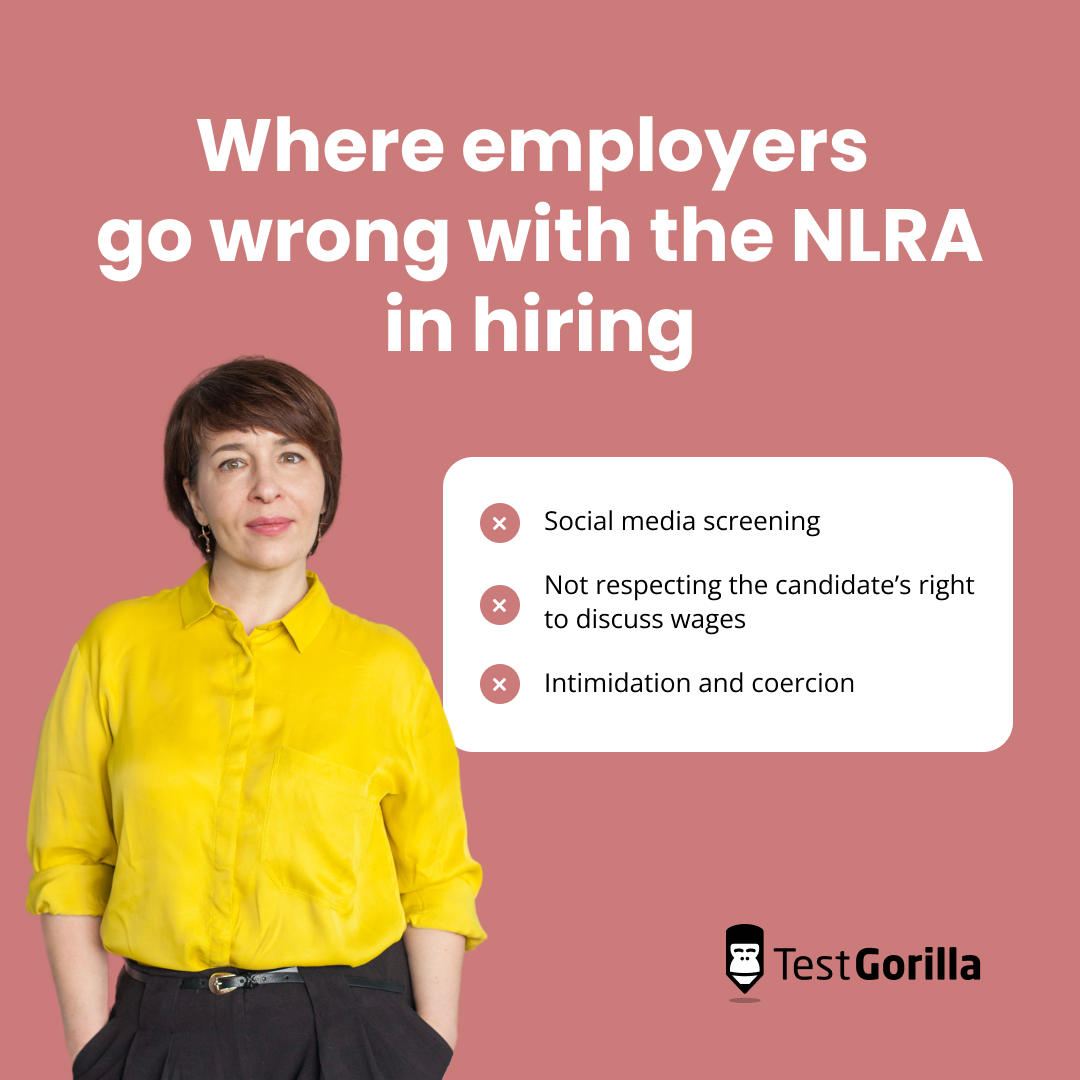The National Labor Relations Act (NLRA) guarantees workers the right to take action as a collective to seek better working conditions. The NLRA applies to almost all workplaces in the US, with requirements starting at the hiring stage.
Despite its broad reach, the NLRA is often misunderstood by employers who believe it only impacts workforces with significant labor union influence. Failing to comply with NLRA requirements, even by accident, can lead to lawsuits and government intervention.
In this guide, we share what you need to know to keep your business NLRA-compliant, examining the rights and obligations imposed on employers and unions, candidate rights, the role of the National Labor Relations Board (NLRB), and why hiring managers should be well-versed in this legislation.
Table of contents
- What is the National Labor Relations Act?
- Why is the National Labor Relations Act relevant to hiring?
- Understanding the rights and obligations imposed by NLRA
- Where employers go wrong with the NLRA in hiring
- NLRA best practices for employers
- Why should hiring managers be aware of the National Labor Relations Act?
- Educate HR managers and streamline hiring with TestGorilla
What is the National Labor Relations Act?
The NLRA, also known as the Wagner Act, was passed in 1935 during the Great Depression. The law aimed to balance the power dynamics between employers and workers by protecting the employees’ rights to organize themselves into a bargaining group, engage in collective bargaining with their employer, and address workplace concerns.
The primary worker rights created by the NLRA include the right to:
Form or join a labor union
Choose not to engage in union activity
Engage in concerted activity for the mutual aid and protection of a group
Express views on labor issues
The primary requirements placed on employers by the NLRA include:
Not interfering with employees’ exercise of rights
Not interfering with the formation or administration of a labor union
Bargaining with employee representatives in good faith
Most private employers are required to comply with the NLRA, even if they don’t have any union employees. Public government employees are excluded from coverage, as well as agriculture and domestic workers.
Compliance by private employers is not always understood and sometimes results in employer activities that subject the company to legal consequences.
The NLRA is interpreted and enforced by the National Labor Relations Board (NLRB). This government agency investigates alleged NLRA violations and accepts complaints through any of its regional offices.
Why is the National Labor Relations Act relevant to hiring?
NLRA protections extend to the hiring process, such as protecting an interviewee’s right to discuss terms and conditions of employment. HR managers and recruitment team members need to understand NLRA requirements to avoid violations.
Key sections of the NLRA relevant to hiring
Three key sections of the NLRA influence hiring.
Section 7 grants employees the right to engage in concerted activities for collective bargaining or for “mutual aid and protection.” Essentially, it safeguards employees' rights to discuss working conditions, wages, and benefits. It also specifically protects self-organization, forming, joining, or assisting labor organizations.
Section 8 prohibits employers from engaging in unfair labor practices. This includes actions such as interfering with employees' rights to organize, discriminating against employees based on their union affiliation, and refusing to bargain in good faith with the employees' chosen representative.
Section 9 outlines the procedures for conducting union elections and certifying employee representatives. Section 9 also created the NLRB and grants it legal authority to enforce the NLRA.
Understanding the rights and obligations imposed by NLRA
The NLRB sets out specific rights for employees and prohibits certain actions by employers and labor unions.
Employees have the right to:
Organize a labor union to negotiate with their employer
Assist, join, or form a labor union
Bargain as a collective group with the employer regarding wages, benefits, working hours, and other working conditions
Discuss employment terms and conditions with coworkers
Discuss union organizing with coworkers or with a union
Act with coworkers to improve working conditions by raising employment complaints or seeking help from a union
Strike and picket in certain circumstances
Choose not to join or remain a union member
Employers must not:
Restrict employees from campaigning for a union during non-work time
Question employees about union activities and support with the goal of discouraging those actions
Take any negative employment action based on an employee’s union support or concerted activity
Threaten to close a workplace if workers choose union representation
Promise benefits to employees in order to affect union support
Prohibit wearing union hats, buttons, pins, or t-shirts in the workplace
Videotape or otherwise spy on peaceful union activities
Unions must not:
Threaten an employee with the loss of their job if they choose not to support the union
Refuse to process an employee grievance
Discriminate in making job referrals
Seek to cause an employer to discriminate against an employee based on their union activity
Take negative action against an employee based on union membership or support
Where employers go wrong with the NLRA in hiring
It’s important to be familiar with the NLRA to avoid taking illegal actions in your business. Possible violations of the NLRA during the hiring process include:
Social media screening
In today's digital age, social media screening has become a common practice. However, it’s essential to exercise caution, as the NLRA can come into play. For example, if social media screening reveals a candidate’s union affiliations or activities, and they are subsequently not hired, it can raise NLRA concerns and lead to allegations of discrimination.
A candidate’s right to discuss wages
The NLRA grants job applicants and employees the right to discuss wages and working conditions during the hiring process.
Employers may inadvertently breach the NLRA when they discourage or penalize candidates for discussing compensation. For instance, if a hiring manager threatens not to hire a candidate who raises questions about wages during an interview.
Intimidation and coercion
While employers have the right to express their views on unionization, they must tread carefully to avoid crossing the line into coercion or intimidation. Employers can run afoul of the NLRA when they pressure candidates regarding their stance on unions during the hiring process.
For instance, insisting that candidates must commit to not joining a union as a condition of employment can be a clear violation of the NLRA. It would also be a violation to ask candidates for their opinions on a pending union organizing drive with the intention of only hiring candidates who don’t support it.
NLRA best practices for employers
Adhering to NLRA requirements and implementing the following best practices will aid you in creating a hiring process that is legally sound, transparent, and conducive to attracting top talent.
Stay informed
Labor laws, including the NLRA, can evolve over time. It's essential to regularly review the NLRA and other relevant labor laws to stay up-to-date on your obligations as an employer.
Keep in mind that members of the NLRB are appointed by the US president, with advice from the Senate. As a result, how the NLRA is interpreted and enforced can vary as the political philosophies of individual board members shift.
Conduct NLRA training
Provide comprehensive training on NLRA compliance for your HR staff and hiring managers. Ensure they understand the potential pitfalls during the hiring process and know how to navigate them.
Seek legal counsel
When in doubt, it's wise to consult with legal experts well-versed in labor law. They can provide guidance and help you avoid legal complications.
Develop clear company policies
Create and communicate clear policies that align with NLRA requirements. These policies should provide guidance to employees and candidates on how the company protects employee rights. It should also emphasize your commitment to fair and legal hiring practices.
Document your process
Maintain thorough records of your hiring decisions, interviews, and any relevant communications. Detailed documentation can serve as a strong defense in case of disputes and allegations.
Why should hiring managers be aware of the National Labor Relations Act?
Hiring managers who understand the NLRA can be a strategic advantage for your company. Their knowledge can help you avoid unfair hiring, as well as:
Avoid costly legal consequences. Violating the NLRA can lead to fines and significant legal fees. By staying informed about NLRA guidelines, hiring managers are able to make legally sound decisions throughout the hiring process.
Create a fair hiring environment. Hiring managers who are well-versed in the NLRA and other equal employment laws are able to create a hiring environment where candidates feel secure. This ensures an opportunity to address any candidate questions or concerns about wages or working conditions transparently.
Prevent discrimination. Not all hiring managers are aware that choosing not to hire a candidate based on their union affiliation is a form of employment discrimination. By ensuring your hiring managers are aware of NLRA requirements, they are better equipped to provide a fair and equitable hiring process.
Build positive labor relations. If you have union representation for some or all of your employees, it’s important that your hiring managers are not hostile when discussing the union. Avoiding actions that could be perceived as anti-union helps build a more harmonious work environment and strengthens your long-term relationship with union leaders.
Educate HR managers and streamline hiring with TestGorilla
The NLRA is an important part of the laws regulating hiring and employment in the US. For hiring managers, it’s not just a matter of legal compliance, but also a means to create an equitable hiring environment.
By understanding the NLRA, hiring managers can build stronger teams while staying on the right side of the law. TestGorilla can help ensure your hiring team is knowledgeable of key laws and compliance standards with on-point tests, including:
Legally compliant hiring is easier when you streamline your process with pre-employment testing. Replace outdated resume screening and hire the best candidates while avoiding unconscious bias.
TestGorilla is revolutionizing recruitment to help you make the best hiring decision for your business while avoiding actions that can raise legal concerns. Reach out today for a free demo to see how TestGorilla can improve hiring processes in your business.
Related posts
Hire the best candidates with TestGorilla
Create pre-employment assessments in minutes to screen candidates, save time, and hire the best talent.
Latest posts
The best advice in pre-employment testing, in your inbox.
No spam. Unsubscribe at any time.

Hire the best. No bias. No stress.
Our screening tests identify the best candidates and make your hiring decisions faster, easier, and bias-free.
Free resources
This checklist covers key features you should look for when choosing a skills testing platform
This resource will help you develop an onboarding checklist for new hires.
How to assess your candidates' attention to detail.
Learn how to get human resources certified through HRCI or SHRM.
Learn how you can improve the level of talent at your company.
Learn how CapitalT reduced hiring bias with online skills assessments.
Learn how to make the resume process more efficient and more effective.
Improve your hiring strategy with these 7 critical recruitment metrics.
Learn how Sukhi decreased time spent reviewing resumes by 83%!
Hire more efficiently with these hacks that 99% of recruiters aren't using.
Make a business case for diversity and inclusion initiatives with this data.


















